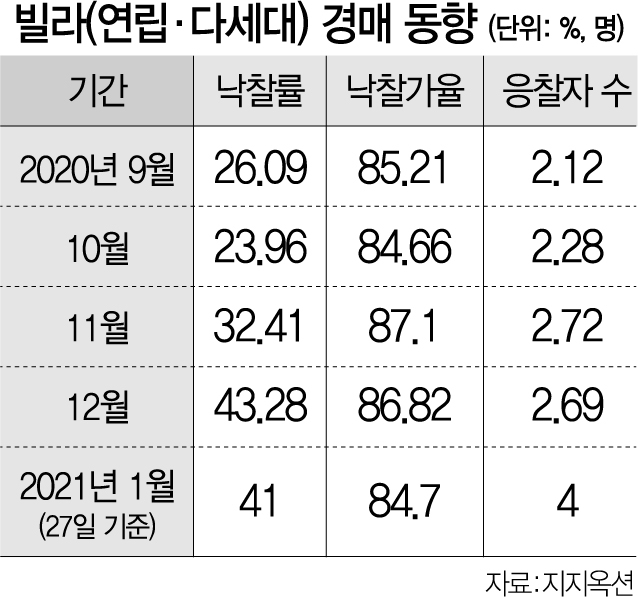Excluding the auction of the land transaction permit regulation
January Seoul coalition multigenerational bid rate 41%
Sold at 190% of the assessed value of the villa in Sinwol-dong
# A household in Gangseo Apartment, a multi-family building located in Ichon-dong, Yongsan-gu, Seoul, won a bid of 240 million won, which is 200% of the appraised value in November. Despite the disadvantage of having a dedicated area of 59m2 and located on the first basement floor, it succeeded in finding the owner at once without having to go through a single inspection. Gangseo Apartment is known as a complex that is interested in the public reconstruction project promoted by the government.
 viewer
viewer
With public redevelopment and public reconstruction projects in full swing this year, the villa auction market, which has been treated with cold meals, is enjoying an unusual boom. The auction bid rate more than doubled compared to the end of last year as more and more investors were trying to win bids for villas or multi-family units in old low-rise residential areas that could be redeveloped at low prices. In particular, investors are paying attention to the fact that real estate acquisition through auction is not regulated by the land transaction permit system. The area selected as a public redevelopment project area is immediately designated as a land transaction permission area, and requires permission from the ward office for real estate transactions over a certain size, but acquisition of auctions is not limited.
According to Jiji Auction on the 31st, the number of bidders and the number of bidders for the Seoul coalition and multi-generation have been rising sharply since December last year. In December, the successful bid rate recorded 43.28%, even though the number of villa auctions plunged to half of the usual level due to the adjournment of the court due to the new coronavirus infection (Corona 19). December was the only month last year when the winning bid rate exceeded 40%. This atmosphere continues in January. As of the 27th, Seoul’s coalition/multigenerational bid rate was 41%, the successful bid price rate was 84.7%, and the average number of bidders was 4. Considering that the average number of bidders last year did not exceed 2, it is truly a’surprise rebound’.
From the end of last year, auction items with high winning bid rates and competition rates, which were hard to find in coalition and multi-generation auctions, began to appear one after another. In November, 36 bidders flocked to the basement floor of the Hyundai Villa located in Shinwol-dong, Yangcheon-gu, Seoul, including the aforementioned Gangseo Apartment, and succeeded in a successful bid for about 190% of the appraised value, or KRW 13,889 million. A household on the second floor of Yangji Villa, located in Sillim-dong, Gwanak-gu, Seoul, won a bid for 598.76 million won, 136% of the appraised value, after 12 people competed. In December, a multi-generational household located in Songpa-dong, Songpa-gu, Seoul, visited the owner for 124% of the appraised value, or KRW 512.1 million. Among the top 10 items in the successful bid price rate, only one item had a history of bidding.
The reason why the coalition and multi-family bid prices have risen in recent years is that expectations for the development of old low-rise residential areas are rising as the government emphasizes revitalizing housing supply. In particular, on the 15th, as the government announced eight public redevelopment pilot projects, investors’ inquiries are pouring not only on the project sites, but also to nearby redevelopment areas.
An official from Jiji Auction said, “In the case of alliances and multi-family members, the winning bid rate and competition rate have declined for four consecutive months since last year, but they are rebounding at the end of the year.” It is expected that competition for villa auctions will be fierce for the time being.”
/ Reporter Park Yoon-sun [email protected]
< 저작권자 ⓒ 서울경제, 무단 전재 및 재배포 금지 >
